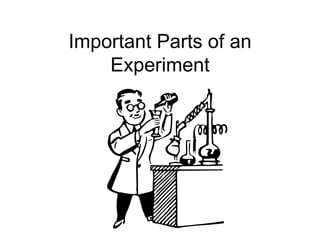
Important parts of an experiment ss
- 1. Important Parts of an Experiment
- 2. Variable: • Factors in an experiment that can change or be changed. • There are different types of variables…
- 3. Types of Variables: Manipulated (also called Independent) Variable: • This is the part of the experiment that is changed ON PURPOSE • The manipulated variable is what is being tested
- 4. Types of Variables (continued) Responding (also called Dependent) Variable: • These are factors in an experiment that change because the manipulated variable was changed • Responding variables are affected by what is being tested.
- 5. Types of Variables (continued) Controlled Variable (or Constants): • These are factors in the experiment that must be kept the same in order to receive reliable results • Controlled variables are kept the same by the experimenter
- 6. Now, set an experiment up on your own… • Imagine you want to find out if listening to a certain type of music improves memory in humans. • How would you test this? • What would your manipulated variable be? • Responding variables? • What would be some controlled variables?
- 7. In science, Observations are CRUCIAL!!! Types of Observations: • Qualitative Observations – Use the senses to notice the properties of the object being observed – Give an example of a qualitative observation you can make about this classroom
- 8. Types of Observations (continued) • Quantitative Observations: – Use measurements of the object being observed
- 9. • Give an example of a qualitative observation you can make in this classroom • Give an example of a quantitative observation you can make in this classroom
- 10. Case Studies With your ______________ Partner, read over the case study given to you. Pick out and summarize the important parts of the experiment (use the sheet in your note packet to jot record answers. Do not write on the blue paper!).
- 11. Join up with another pair that have the same experiment. Create a presentation about the experiment to inform the class. Tell us about what the experimenters did and what they discovered. Also, give your opinion on how the experiment could be improved. Use the chart paper as a visual aid that will enhance your presentations
